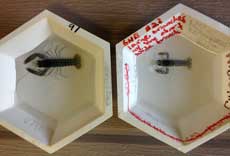 “New Approaches to Understanding Emerging Marine Diseases: From Science to Management” is the 9th Annual Ronald C. Baird Sea Grant Science Symposium
“New Approaches to Understanding Emerging Marine Diseases: From Science to Management” is the 9th Annual Ronald C. Baird Sea Grant Science Symposium
KINGSTON—The public is invited to attend the 9th Ronald C. Baird Sea Grant Science Symposium on August 10‐11, 2010, on “New Approaches to Understanding Emerging Marine Diseases: From Science to Management” at the University of Rhode Island.
The symposium follows the conclusion of a $3 million New England Lobster Research Initiative that looked into the causes of lobster shell disease and the contributing factors that make lobsters vulnerable to the disease.
Increasingly, lobsters with shell disease have been found off the coast of New England. Over the past several years, 30 percent of lobsters caught have had shell disease.
There is no mistaking a lobster with shell disease – there are black spots on its shell, and the worst cases appear to have shells that are rotting away, in some cases killing the lobster through secondary infection or as a result of other stresses.
The initiative funded scientists from 16 institutions who spent three years studying shell disease. Experts in crustacean endocrinology, genetics, veterinary medicine, behavior, microbiology, lobster biology, chemistry, environmental science, and epidemiology worked together with fishermen and resource managers to uncover the dynamics of shell disease.
They will present their findings, and the implications for dealing with shell disease and other marine diseases, at the Baird Symposium at URI’s Center for Biotechnology and Life Sciences. The symposium is free to attend, including meals, but registration is required. For more information or to register, visit the web site at seagrant.gso.uri.edu/baird/2010_diseases.html or contact Tracy Kennedy at (401) 874‐6800.
About the initiative: Congress appropriated $3 million to establish a cooperative research program—the New England Lobster Research Initiative—to study the causes and consequences of lobster shell disease. This funding is jointly managed by the National Oceanic and Atmospheric Administration’s National Marine Fisheries Service, URI, and Rhode Island Sea Grant. The goal of this project was to describe the disease agent and how it works, and to determine the extent and severity of the disease in New England waters. For more information visit seagrant.gso.uri.edu/lobster_initiative/.
About Rhode Island Sea Grant: Rhode Island Sea Grant is based at the University of Rhode Island, and is part of NOAA’s National Sea Grant College Program. Rhode Island Sea Grant promotes the conservation and sustainable development of coastal and marine resources for public benefit through research, education, outreach, and legal programs.

